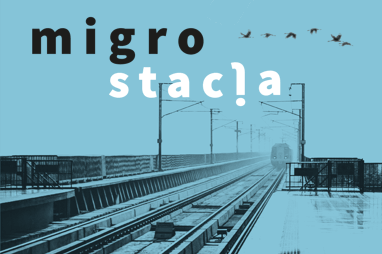The first episode of the “Migrostacja” (Migrostation) podcast

08 09 2021
Category: III.3.2, Podcasts, Results
Several days ago, the premiere of the first episode of the “Migrostacja” (Microstation) podcast took place, which was carried out as part of IDUB Action III.3.2 “Promotion of scientific research in the public domain – 2nd edition”.
Did it really use to be easier to become a minister than a migrant in Poland? Can you be a migrant without being on the move? What lies behind the language used to describe migration, and how well do we understand the political power behind terminology? How should migration policy be created? What about Brexit and the case of Poland? There are many questions.
The “Migrostacja” podcast offers answers from the perspective of current findings in migration research. The aim of the authors is to broadcast reliable and scientifically based information about migration, which is a subject that has become one of the most polarised social, political, and economic issues in recent years. Public and media discourse about migration is often sensationalised, sometimes inaccurate, and is frequently politicised. In the spirit of social and academic responsibility, researchers from the Centre of Migration Research want to contribute to a reliable discussion about migration, through the production of these podcasts, which are based on scientific research that is being carried out at UW.
The first episode is led by dr Dominika Pszczółkowska, and the guests include prof. Marek Okólski and prof. Dariusz Stola. They undertake topics such as: Did it really use to be easier to become a minister than a migrant in Poland? Can you be a migrant without being on the move? And are we all migrants, perhaps? Among other things, it is about love, the village of Stare Juchy, and a certain sailor who had a sizable influence on the phenomenon of Poles emigrating to Iceland; it also concerns breakthrough moments that changed the scale of mobility in the world, and how the history of migration shapes the language we use today to talk about it.
The podcasts will appear every two weeks and are available on the following platforms:
- YouTube: https://youtu.be/DOo15HYyn9w
- Spotify: https://open.spotify.com/show/4XUt7pS6Qtd1AGHfn8JbXM
- Anchor: https://anchor.fm/migrostacja
- Breaker: https://www.breaker.audio/migrostacja
- Google Podcast: https://podcasts.google.com/feed/aHR0cHM6Ly9hbmNob3IuZm0vcy8xZTI1NDJjMC9wb2RjYXN0L3Jzcw==
- Pocketcast: https://pca.st/a4paifur
- RadioRepublic: https://radiopublic.com/migrostacja-WdXQKp
We invite you to listen to them!